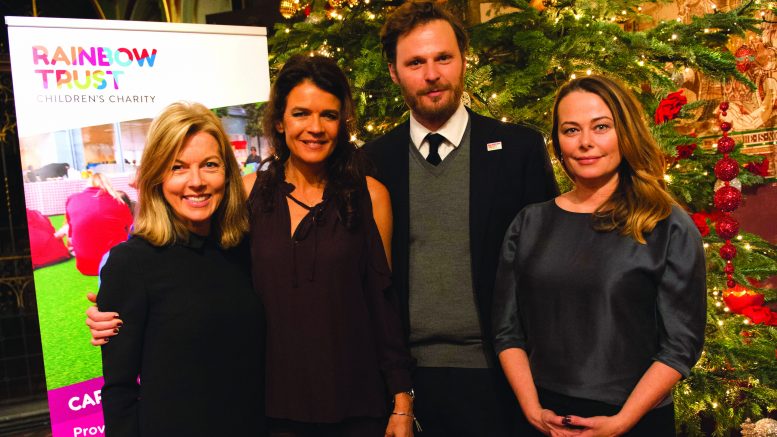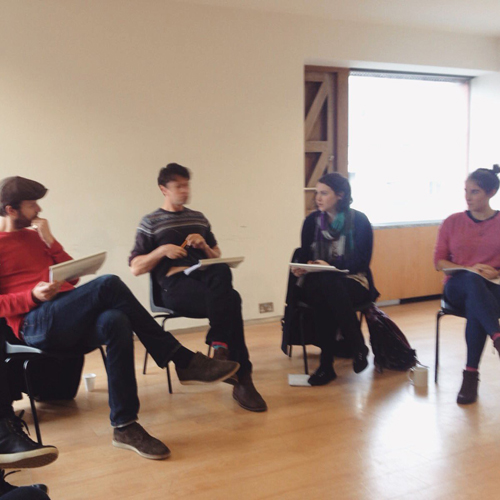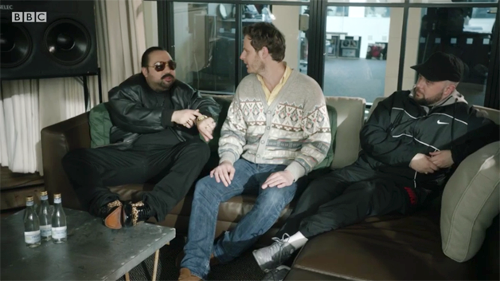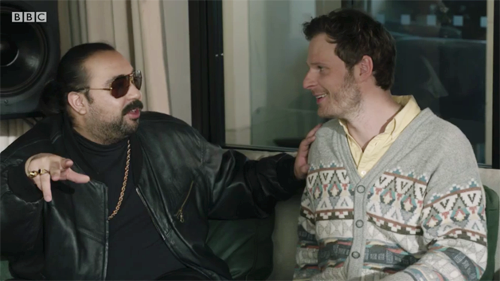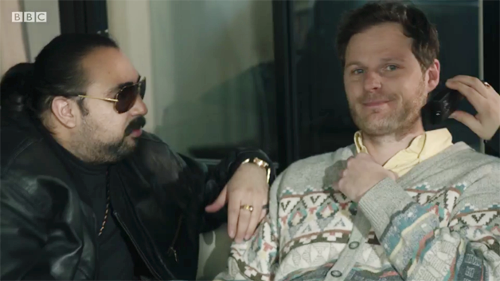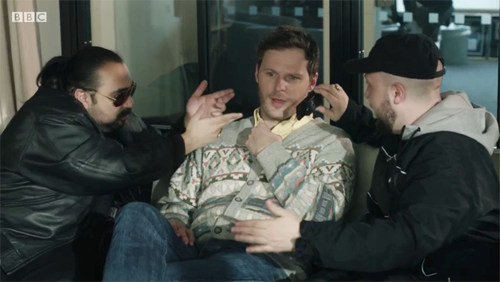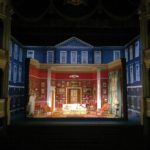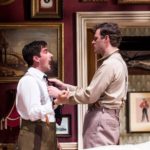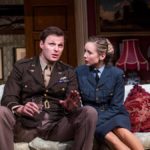The Orange Tree Theatre hosted a post-show Q+A on Wednesday 1 June, featuring the director Paul Miller (also the theatre’s Artistic Director), as well as cast members Helen Bradbury (Grace Tranfield), Michael Lumsden (Colonel Craven), Mark Tandy (Cuthbertson), Paksie Vernon (Sylvia Craven) and Rupert Young (Leonard Charteris).
Given the lateness of the hour, it was kept fairly brief, but it was very interesting.
Warning: There are spoilers ahead!
Paul Miller came out while the cast were still getting ready, and spoke about the choice of play. He feels there is something very lively in George Bernard Shaw’s early plays. Having already successfully put on Shaw’s first play, Widower’s Houses (written and produced 1892), it made sense to consider his second play, The Philanderer (written 1893, produced 1902).
Paul thought the language of it was amazing, and eccentric, with Swiftian and Wildean elements. He also liked the subject matter, of how intelligent people handle the inherent clumsiness of intimate relationships. While so much has changed since the time the play was written, we still suffer from that clumsiness today.
Shaw originally wrote the play in three acts, with the third act set four years later and ending in a divorce. However, a friend of his suggested that wouldn’t do, so Shaw wrote a new third act, which continued on directly from the second act, and ended with a proposal of marriage being accepted. That is how the play was produced – until 25 years ago, when a company experimented by using both endings, with the proposal first, and then the divorce scene. That is how the play is being presented at the Orange Tree during this run.
However, Paul said that he felt the proposal scene was so brilliantly written – so Mozartian! – that he can’t believe it was included by Shaw in a reluctant way. He is therefore not so sure that the story of the two alternate acts is entirely true.
By now the actors had assembled, so Paul asked them to talk about Shaw’s language, and how they worked with it.
Rupert said that initially he’d felt intimidated, and that he hadn’t even taken the opportunity to see a recent production of Man and Superman (1902) as he’d thought he wouldn’t enjoy it. When he’d read The Philanderer, however, with a view to auditioning for this role, he’d been amazed at how easy it was to read.
Paksie said the language was challenging, but fun. Michael said that Shaw’s sentences are so long and complex that it isn’t always clear how funny the lines will be. Once you make the sentence make sense, however, the humour emerges. He concluded that it plays better than it reads!
Helen said that Shaw obviously had an ear for language, with its rhythms and inflections. Mark said that Shaw was more Irish than we think he is. His lines are fantastically well punctuated. Mark’s approach was to seek out the verb, and lean on it. (Michael complained that he had a lot of lines without any verbs!)
The audience had more remarks than questions, but the feedback given to the actors and director was wonderful to hear. In dot-point form, if you’ll forgive me:
- ‘It all really worked, beautifully well.’
- As a long-time Shaw fan, one man was delighted with the production. He said that Shaw is always preaching, but lucidly so. He was impressed by the cast remembering the lines, which aren’t easy. (‘Oh, we never had any trouble with that,’ Paul and Rupert joked. ‘No, right from day one…’)
- A woman was delighted by the inclusion of the ‘fourth’ act, so that the play didn’t end with the proposal. She felt that it helped further explore the themes and issues raised by the rest of the play. It also made the play more relatable, more relevant to life as we know it.
- The ‘lightness and freshness’ in the production was wonderful.
I had the chance to ask a question, so I asked Rupert how he approached a character like Leonard, who is interesting and fun but also appalling. (And I’ll probably get his answer all out of order, as I was just sitting there listening while he spoke.)
When initially analysing the character, Rupert noticed that Leonard never apologised, and he thought that was important. (I agree this is important, and I think that if Leonard ever did apologise, it would take all the wind out of his sails.) Otherwise, Rupert thought about what, in any given moment, does Leonard want – and when is he lying? He’d found the ‘fourth’ act challenging, in that he needed to figure out why Leonard wanted the couple to divorce. Originally, Rupert wondered if it was a happy ending, and if Leonard had changed in the four-year interval, but he soon saw that wasn’t the case. Rupert added that Leonard was nothing like him, but it was fun to play the mean aspects of Leonard’s character.
Paul (I think?) said that he felt the verbal jousting of the characters suited the theatre, which is laid out ‘in the round’. Michael agreed that the cast could relate to their fellow actors in a more natural way – as opposed to a traditional ‘proscenium arch’ theatre, where the actors always need to be oriented towards the audience. Mark (?) said it was scary when you first came out into the space. (And I think it must be, as even with the lighting focused on the stage area, you can still see everyone in the audience, at both the lower and upper levels.)
Rupert said that the audience is an integral part of the show. The actors can feel the energy from the audience – and can feel that energy changing as the story progresses, and the audience’s approval of a character fluctuates.
Paul called an end to the talk, reminding us that the cast and crew had two shows to deliver the next day. And so ended a lovely evening!
If you want to see the play, there are still tickets available throughout the run to 25 June. It is a small theatre, and in terms of enjoying the play, there are no bad seats! Visit the theatre’s website for all the details.
